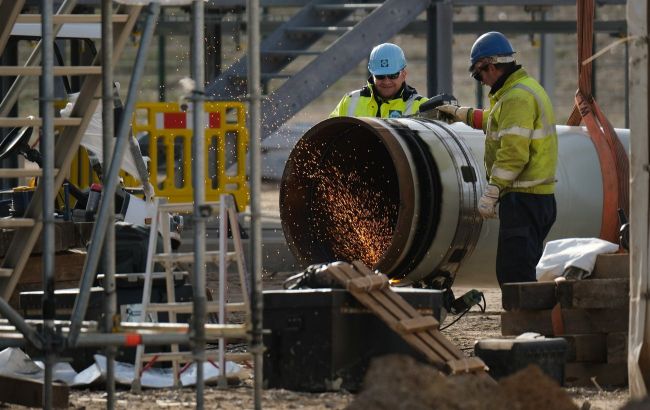Historic mistake: How Berlin advocated for Nord Stream 2 and the sabotage case
 Photo: The Nord Stream 2 gas pipeline has never been launched (Getty Images)
Photo: The Nord Stream 2 gas pipeline has never been launched (Getty Images)
Recently declassified documents have shed light on the role of the German government in promoting the Nord Stream 2 project. Unlike official statements, they show the government's close involvement in constructing the gas pipeline from Russia.
Contents
- How the project was promoted in Germany: 'Chronicle of a historic mistake'
- Nord Stream blasts case
- US, Russia, or Ukraine? Main versions
How the project was promoted in Germany: 'Chronicle of a historic mistake'
Nord Stream 2 is a 1,200-kilometer-long gas pipeline from Russia to Germany across the Baltic Sea. Its construction was completed in 2021. It is an expansion of Nord Stream 1, which has been in operation since 2011. Unlike its predecessor, it was not launched due to Russia's full-scale invasion of Ukraine.
Angela Merkel's government has consistently defended Nord Stream 2 as a regular business project. Because of this, Germany has gained a reputation as a country blind to Russian aggression. Recently discovered documents confirm these accusations, and the Süddeutsche Zeitung published an article with the headline 'Chronicle of a Historic Mistake.'
The German media gained access to documents from the Ministry of Economy that were classified as part of the blast investigation. They show how Merkel, her ministers, and then Chancellor Olaf Scholz supported the project, deliberately making the country dependent on Russian gas.
"Neither the resistance of Eastern European countries, Brussels or Washington, nor the wicked actions of the Putin regime could change anything," the Süddeutsche Zeitung said.
The then Vice Chancellor and Minister of Economy Sigmar Gabriel learned about Russia's plans for a new gas pipeline in June 2015. Slovak Prime Minister Robert Fico opposed the project. A year later, officials advised Gabriel to turn to Poland and Slovakia because "if the interests of these countries are respected, the opposition will disappear." Warsaw and Bratislava were opposed because of the threat of stopping gas transit through their territory.
The Ministry of Economy also maintained close contact with Matthias Warnig from the management of Nord Stream 2 AG. He is a former agent of the secret East German Stasi police and a friend of Vladimir Putin.
The Ministry did not give up after many countries opposed Nord Stream 2. The new US President Donald Trump tried to stop the construction. His administration imposed sanctions on the operators.
Nord Stream 2 AG then financed setting up a climate and environmental fund in Mecklenburg-Vorpommern. The organization sought to circumvent the sanctions and help complete the pipeline. When Joe Biden took office in 2021, sanctions were eased and Nord Stream 2 AG avoided fines.
"Already in June 2021, the Polish parliament drew attention to the deployment of Russian troops near the Ukrainian border and the threat of a serious conflict on the EU's borders," the media notes. The Sejm called for an immediate halt to the project, expressing solidarity with Ukraine and Central European countries threatened by Russian expansionism.
But the German Ministry of Economy did not respond. In early September 2021, Nord Stream 2 was completed, but it was stuck at the certification stage. A few months later, after Russia invaded Ukraine on a full scale, the project was frozen. On September 26, 2022, both Nord Stream 2 and Nord Stream 3 were blown up.
The investigation is still ongoing.
Nord Stream blasts case
Powerful explosions ruptured three of the four lines of the Nord Stream gas pipeline in the international waters of the Baltic Sea. According to some estimates, more than 500 kilograms of methane were released into the atmosphere during the week.
NATO's North Atlantic Council called it a reckless and irresponsible act of sabotage, while Putin called it an act of international terrorism.
The explosions happened in the exclusive economic zones of Sweden and Denmark, both countries launched separate investigations. The initial version suggested Moscow was most likely behind the explosions.
Sweden closed the case in early February 2024, stating that its jurisdiction did not apply because neither citizens nor state interests were harmed. A few days later, the investigation was completed in Denmark. According to the Copenhagen police, the sabotage was deliberate, the investigation was complex and extensive. But they did not provide any details.
For Thomas Wegener Friis, an intelligence expert at Odense University, the Nord Stream case - is a game without winners, at least from the Danish point of view. The local police and its secret service, PET, have the highest level of trust, this is one of the reasons why there have been no critical questions or even outrage over terminating the investigation.
An exception is Bo Elkjær from the Danish daily Information. The reporter has been working on the investigation since September 2022. According to him, the only thing that is clear is that the explosions were an act of deliberate sabotage. He also noted that the Danish Navy had been monitoring Russian ships near one of the sites of the sabotage. The case file contains 112 photos of these ships, but they have never been published.
Today, only Germany is investigating the Nord Stream blasts. But almost nothing is known about the status of the investigation. German Prosecutor General Jens Rommel told NDR that the federal prosecutor's office is in contact with investigative agencies in other countries. However, he did not comment on the details.
"Considering the ongoing investigation, no further information can be provided," he added.
US, Russia, or Ukraine? Main versions
Although the police and intelligence services of Denmark and Sweden have never publicly named any suspects, several versions have been put forward in the media. One of them belongs to the American journalist Seymour Hersh, whose reputation has been discredited for his love of conspiracy theories.
In February 2023, he published an article citing an informed source that alleged the involvement of the United States and Norway. The report was denied in Oslo and Washington. Unsurprisingly, Moscow was the only one to agree with this version.
In March 2023, The New York Times published an article claiming that a pro-Ukrainian group was behind the bombings. This was followed by articles in Die Zeit, ARD, and SWR. According to them, a German intelligence report stated that Putin's opponents, who were not affiliated with the Ukrainian leadership, were involved in the attacks.
Allegedly, a few days before the explosions, a 15-meter yacht, the Andromeda, was in the area with an unknown cargo. The vessel was rented by a Polish company owned by two Ukrainians. The operation allegedly involved 6 people. The yacht was returned uncleaned, and traces of explosives were found on the table in the cabin. The intelligence materials did not contain information about the ordering parties and executors.
Even Putin called the version of the pro-Ukrainian group groundless. German Defense Minister Boris Pistorius warned against jumping to conclusions. The Ukrainian trail is considered unconvincing, as the yacht had no special equipment. Besides, the question remains how the saboteurs could have smuggled a large amount of explosives.
However, Andromeda is still the focus of investigators' attention. According to Bo Elkjær, it is difficult to prove this version, because the weather on the Baltic Sea allowed the people on the small yacht only one day for four extremely difficult dives. Moreover, the explosion sites are more than 70 kilometers apart.
The journalist is leaning toward a Russian trail. Shortly before the sabotage, six Russian ships were in the attack zone at once. They included a special ship, the SS-750, with a mini-submarine on board and two tugs capable of performing operations at a depth of 70-80 meters using a crane and a diving chamber. "If you ask me, I know which direction the arrow is pointing," he added.
The case of the Nord Stream идфіеі still raises more questions than answers. According to Western media, the materials are kept under strict control because of the diplomatic implications of what may be revealed.
Sources: Süddeutsche Zeitung, NDR, and an article on Carnegie Endowment for International Peace.

